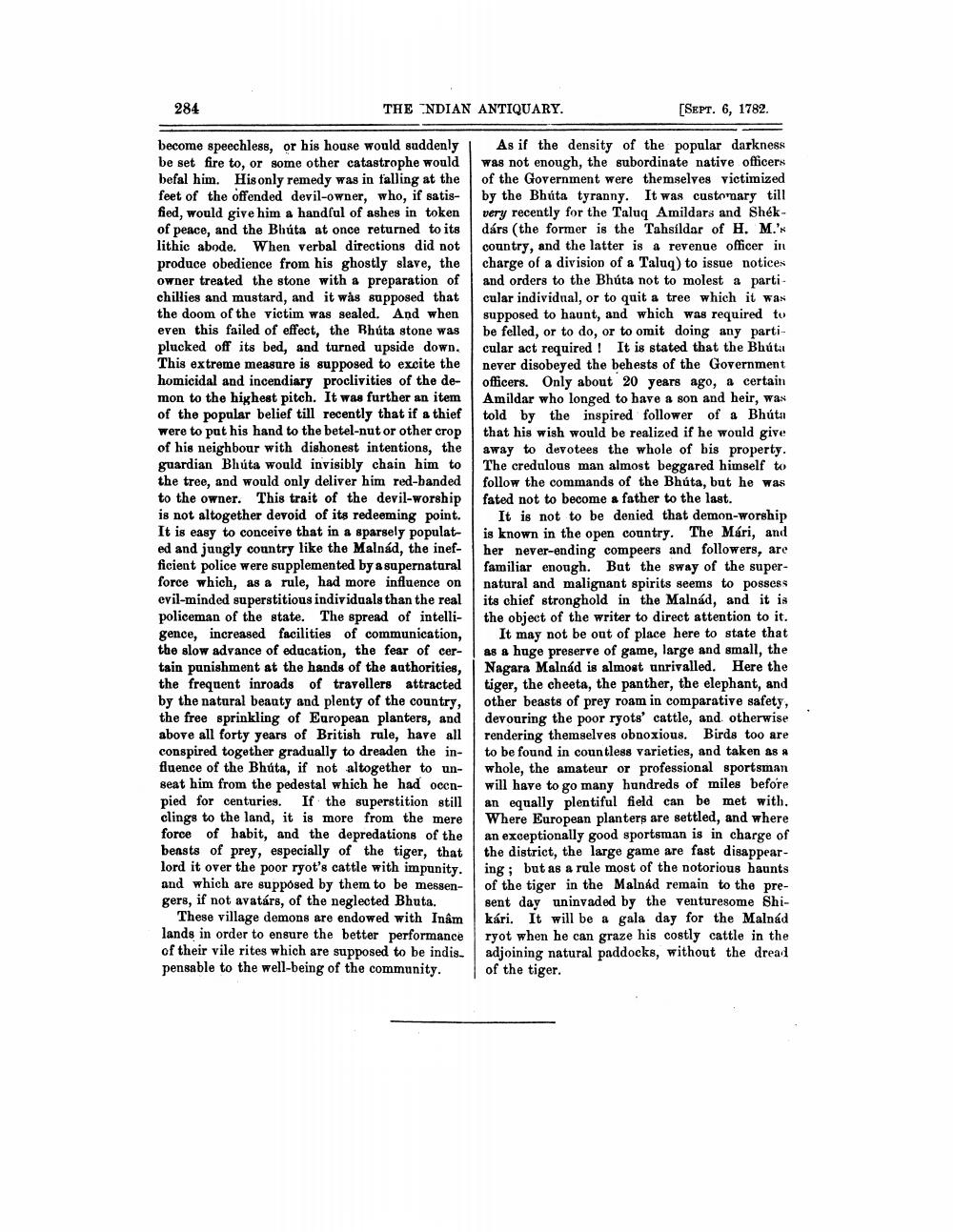________________
284
THE NDIAN ANTIQUARY.
[SEPT. 6, 1782.
become speechless, or his house would suddenly be set fire to, or some other catastrophe would befal him. His only remedy was in falling at the feet of the offended devil-owner, who, if satisfied, would give him a handful of ashes in token of peace, and the Bhúta at once returned to its lithic abode. When verbal directions did not produce obedience from his ghostly slave, the owner treated the stone with a preparation of chillies and mustard, and it was supposed that the doom of the victim was sealed. And when even this failed of effect, the Bhúta stone was plucked off its bed, and turned upside down. This extreme measure is supposed to excite the homicidal and incendiary proclivities of the demon to the highest pitch. It was further an item of the popular belief till recently that if a thief were to put his hand to the betel-nut or other crop of his neighbour with dishonest intentions, the guardian Bhúta would invisibly chain him to the tree, and would only deliver him red-banded to the owner. This trait of the devil-worship is not altogether devoid of its redeeming point. It is easy to conceive that in a sparsely populat- ed and inngly country like the Malnád, the inef- ficient police were supplemented by a supernatural force which, as a rule, had more influence on evil-minded superstitious individuals than the real policeman of the state. The spread of intelligence, increased facilities of communication, the slow advance of education, the fear of certain punishment at the hands of the authorities, the frequent inroads of travellers attracted by the natural beauty and plenty of the country, the free sprinkling of European planters, and above all forty years of British rule, have all conspired together gradually to dreaden the influence of the Bhúta, if not altogether to unseat him from the pedestal which he had ocenpied for centuries. If the superstition still clings to the land, it is more from the mere force of habit, and the depredations of the bensts of prey, especially of the tiger, that lord it over the poor ryot's cattle with impunity. and which are supposed by them to be messengers, if not avatárs, of the neglected Bhuta.
These village demons are endowed with Inâm lands in order to ensure the better performance of their vile rites which are supposed to be indis. pensable to the well-being of the community.
As if the density of the popular darkness was not enough, the subordinate native officers of the Government were themselves victimized by the Bhúta tyranny. It was customary till very recently for the Taluq Amildars and Shékdárs (the former is the Tahsildar of H. M.'s country, and the latter is a revenue officer in charge of a division of a Taluq) to issue notices and orders to the Bhúta not to molest a particular individual, or to quit a tree which it was supposed to haunt, and which was required to be felled, or to do, or to omit doing any particular act required! It is stated that the Bhúta never disobeyed the behests of the Government officers. Only about 20 years ago, a certain Amildar who longed to have a son and heir, was told by the inspired follower of a Bhúta that his wish would be realized if he would give away to devotees the whole of bis property. The credulous man almost beggared himself to follow the commands of the Bhúta, but he was fated not to become a father to the last.
It is not to be denied that demon-worship is known in the open country. The Mári, and her never-ending compeers and followers, are familiar enough. But the sway of the supernatural and malignant spirits seems to possess its chief stronghold in the Malnád, and it is the object of the writer to direct attention to it.
It may not be out of place here to state that as a huge preserve of game, large and small, the Nagara Malnád is almost anrivalled. Here the tiger, the cheeta, the panther, the elephant, and other beasts of prey roam in comparative safety, devouring the poor ryots' cattle, and otherwise rendering themselves obnoxious. Birds too are to be found in countless varieties, and taken as a whole, the amateur or professional sportsman will have to go many hundreds of miles before an equally plentiful field can be met with. Where European planters are settled, and where an exceptionally good sportsman is in charge of the district, the large game are fast disappearing; but as a rule most of the notorious haunts of the tiger in the Malnád remain to the present day uninvaded by the venturesome Shikári. It will be a gala day for the Malnád ryot when he can graze his costly cattle in the adjoining natural paddocks, without the dread of the tiger.




